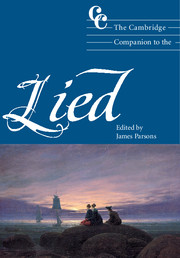Book contents
- Frontmatter
- Part I Introducing a genre
- Part II The birth and early history of a genre in the Age of Enlightenment
- 2 The eighteenth-century Lied
- 3 The Lieder of Carl Philipp Emanuel Bach, Haydn, Mozart, and Beethoven
- Part III The nineteenth century: issues of style and development
- Part IV Into the twentieth century
- Part V Reception and performance
- Index
3 - The Lieder of Carl Philipp Emanuel Bach, Haydn, Mozart, and Beethoven
from Part II - The birth and early history of a genre in the Age of Enlightenment
Published online by Cambridge University Press: 28 September 2011
- Frontmatter
- Part I Introducing a genre
- Part II The birth and early history of a genre in the Age of Enlightenment
- 2 The eighteenth-century Lied
- 3 The Lieder of Carl Philipp Emanuel Bach, Haydn, Mozart, and Beethoven
- Part III The nineteenth century: issues of style and development
- Part IV Into the twentieth century
- Part V Reception and performance
- Index
Summary
Many song historians might hesitate before presenting C. P. E. Bach (1714–88), Haydn (1732–1809), Mozart (1756–91), or Beethoven (1770–1827) as landmark composers in the development of the German Lied. Some would argue any place for them in such a narrative would depend on their towering achievements in instrumental music or opera, rather than on the value of their songs themselves. These composers’ engagement with song is often taken as a sign of the inclusive nature of their musical ambitions, rather than their interest in the genre for its own sake. In retrospect, Viennese Classicism has become parceled up with the notion of an all-embracing “style” which spread from Italian comic opera to the genres of sacred and instrumental music, a generalization that leaves little room for the Lied. Indeed theories of the Lied, as they emerged through the eighteenth century, demanded a specific stylistic justification from composers, a conscious choice of style based on their individual response to a poetic text. Some theorists reinforced this distinctiveness by denying song composers recourse to instrumental or operatic idioms at all. Yet ideals of stylistic simplicity are less significant perhaps than the broader aesthetic notion that the starting point for a composer's style should be a poem or a poet. For better or for worse, subservience to poetry seems to run counter to the achievements that these four masters of Classicism represent.
- Type
- Chapter
- Information
- The Cambridge Companion to the Lied , pp. 63 - 82Publisher: Cambridge University PressPrint publication year: 2004
- 1
- Cited by

